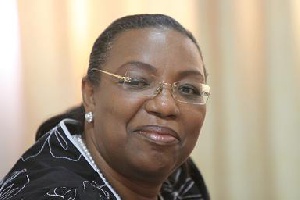Education Minister, Betty Mould-Iddrisu has reiterated the Mills-led administration’s commitment to raising educational standards in the country with a call on stakeholders in the education sector to prioritize the provision of accommodation for teachers, particularly those serving in rural areas.
Speaking on Multi TV’s political talk show, Majority Caucus, the Minister said “Teacher accommodation blocks in the rural and underserved communities are our priority that is why I am urging Regional Ministers, District Chief Executives [and] the Ghana Education Service, to make this your priority. Put up TABs [teacher accommodation blocks], let your teachers have somewhere to lay their heads.”
She explained that government is still working on improving education at the basic level in all districts across the country. To this end, she noted that government has resolved to strengthen social intervention programs like capitation grants, school feeding programme and the provision of free school uniforms to pupils.
“In the poorest districts in the country, really some children, [and] some families cannot afford a uniform for their children. Unfortunately, this manifests itself more in the girl child. She is reduced to this disadvantage of not being able to access school because of lack of basic amenities” she said.
“In the areas where we have the School Feeding Programme [and Free School], we have higher enrollment of the girl child and these are policies that need a certain amount of sustenance” the Minister added.
Mrs. Mould-Iddrisu also noted that allocations for capitation grant for the new academic year have been disbursed to various schools in the country. She explained that the allocation was based on the number of pupils in a school.
“Each term, enrolment might change for one reason or the other, so we have released the money based on the number of children in the schools.”
She also shed some light on government’s efforts at improving ICT education in Ghana.
“This programme involves 2 phases. The first phase is the 1500 computers which have gone to 100 schools in Ghana, 10 schools in each region. The second phase is the roll out of 60,000 computers and it includes projectors which will be put up in schools which have large population of students. It also involves training of teachers, it involves having a mobile compartment where all the laptops will be secured and they will be charged at a central point. There are also service centers in each region to service the computers” she noted.
General News of Thursday, 22 September 2011
Source: Ewurabena Yorke/ Multi TV













